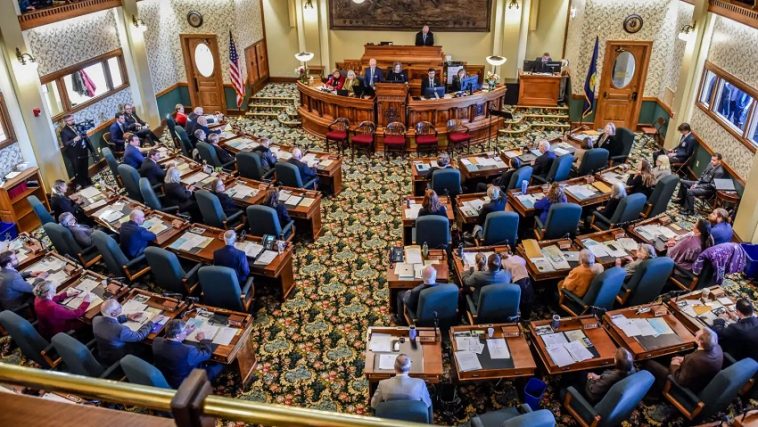The Montana Senate has become the epicenter of political tension following allegations of criminal misconduct against former Senate leader Jason Ellsworth. A heated debate on Thursday led to a decisive vote to suspend an ongoing Senate Ethics Committee investigation and refer the matter to the state Department of Justice (DOJ) for further investigation.
Ellsworth, a Republican from Hamilton, is facing accusations of awarding a $170,100 contract to a former business associate, Bryce Eggleston, in a manner designed to avoid the state law requiring competitive bidding for contracts of $100,000 or more. Specifically, Ellsworth is accused of splitting the contract into two smaller agreements, raising questions about the legitimacy of the arrangement and Eggleston’s qualifications to carry out the work. The contract was intended for Eggleston to observe and report on the implementation of laws proposed by Republican legislators aimed at limiting the power of Montana’s courts.
The allegations came to light after a brief investigation, but neither Ellsworth nor Eggleston were interviewed by the Ethics Committee. Adding fuel to the fire, Senate President Matt Regier initially selected Matt Monforton, a former Republican legislator, to prosecute the case, despite Monforton’s history of publicly criticizing Ellsworth on social media. The selection of Monforton raised concerns among Democrats about the fairness of the process.
Senate Minority Leader Pat Flowers, a Democrat, led the charge to remove the case from the Ethics Committee and place it under the purview of the DOJ. Flowers argued that the investigation had been tainted by political motivations and that the Department of Justice was better equipped to handle such allegations impartially. In a dramatic floor debate, Flowers stated that the Senate needed to focus on passing legislation, not becoming entangled in an extended investigation.
“Let us get to work on actual legislation and let the Department of Justice do the investigation,” Flowers said, echoing sentiments of several Democrats who rallied behind his motion.
The move was met with strong opposition from Republican senators, who were furious at the shift of responsibility to the DOJ. Some Republicans openly voiced their frustration, with Senator John Fuller of Kalispell calling the decision “angry” and “embarrassing.” Additionally, Senator Tom McGillvray of Billings claimed to have communicated with Attorney General Austin Knudsen, who reportedly disagreed with the Senate’s decision to defer the matter to the DOJ. However, Democrats, including Senator Shane Morigeau, a Missoula attorney, defended the decision, arguing that it was essential to ensure a fair and thorough investigation.
Despite the criticism, Ellsworth himself sided with the Democrats, voting in favor of referring the case to the DOJ. His decision marked a rare moment of bipartisan agreement, as it came after Ellsworth’s own party attempted to strip him of a key committee assignment.
The case has sparked further tensions within the Senate, particularly among Republicans, who view Ellsworth as a moderate voice capable of bridging the divide between hard-right members and more centrist legislators. In recent years, Ellsworth has played a crucial role in securing key pieces of legislation, such as the continued expansion of Medicaid eligibility, a priority for both moderate Republicans and Democrats.
Republicans, however, have accused Flowers of political maneuvering, claiming that the move to refer the case to the DOJ was an attempt to weaken conservative priorities in the legislature. The controversy also highlights ongoing tensions in the Senate, where moderate Republicans have formed strategic alliances with Democrats to prevent far-right initiatives from gaining traction.
As the investigation moves forward, the political fallout from the Ellsworth controversy is expected to continue shaping the legislative landscape in Montana. With the DOJ now in charge, both sides are bracing for what could become a prolonged legal process, leaving some Republicans concerned that a resolution may not come before the 2025 legislative session concludes.



